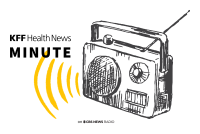Latest Morning Briefing Stories
Watch: Older Americans Say They Feel Stuck in Medicare Advantage Plans
You’ve probably seen advertising about Medicare Advantage plans. KFF Health News’ Sarah Jane Tribble explains the pros and cons of this insurance option as enrollment in these plans increases.
What the Health? From KFF Health News: The Supreme Court vs. the Bureaucracy
The Supreme Court this week heard oral arguments in a case that could radically alter the way federal agencies — including the Department of Health and Human Services — administer laws passed by Congress. A decision in the case is expected this spring or summer. Meanwhile, the Biden administration is struggling over whether to ban menthol cigarettes — a move that could improve public health but also alienate Black voters, the biggest menthol users. Joanne Kenen of Johns Hopkins University and Politico Magazine, Lauren Weber of The Washington Post, and Rachel Cohrs of Stat join KFF Health News chief Washington correspondent Julie Rovner to discuss these issues and more. Also this week, Rovner interviews Darius Tahir, who reported and wrote the latest KFF Health News-NPR “Bill of the Month” feature about a lengthy fight over a bill for a quick telehealth visit.
What the Health? From KFF Health News: All About the (Government) Funding
With days to go until a large chunk of the federal government runs out of money needed to keep it operating, Congress is still struggling to find a compromise spending plan. Meanwhile, the Supreme Court agreed to hear — this year — a case that pits federal requirements for emergency treatment against state abortion bans. Alice Miranda Ollstein of Politico, Sarah Karlin-Smith of the Pink Sheet, and Tami Luhby of CNN join KFF Health News chief Washington correspondent Julie Rovner to discuss these issues and more. Also this week, Rovner interviews American Medical Association President Jesse Ehrenfeld about the choppy waters facing the nation’s physicians in 2024.
Listen to ‘Tradeoffs’: How the Loss of a Rural Hospital Compounds the Collapse of Care
Six years ago, the hospital in Fort Scott, Kansas, shuttered, leaving residents in the small community without a cornerstone health care institution. In the years since, despite new programs meant to save small hospitals, dozens of other communities have watched theirs close.
What the Health? From KFF Health News: New Year, Same Abortion Debate
Some Supreme Court justices were wrong if they assumed overturning “Roe v. Wade” would settle the abortion issue before the high court. At least two cases are awaiting consideration, and more are in the legal pipeline. Meanwhile, Congress once again has only days until the next temporary spending bill runs out, with no budget deal in sight. Lauren Weber of The Washington Post, Shefali Luthra of The 19th, and Victoria Knight of Axios join KFF Health News chief Washington correspondent Julie Rovner to discuss these issues and more. Also this week, Rovner interviews Sandro Galea, dean of the Boston University School of Public Health, about how public health can regain public trust.
Listen to the Latest ‘KFF Health News Minute’
“Health Minute” brings original health care and health policy reporting from the KFF Health News newsroom to the airwaves each week.
States Expand Health Coverage for Immigrants as GOP Hits Biden Over Border Crossings
More than 1 million immigrants, most lacking permanent legal status, are covered by state health programs. Several states, including GOP-led Utah, will soon add or expand such coverage.
An Arm and a Leg: When Hospitals Sue Patients (Part 2)
Why do hospitals sue patients who can’t afford to pay their medical bills? On this episode of “An Arm and a Leg,” host Dan Weissmann investigates such lawsuits and covers new laws and regulations that may change this practice.
‘AGGA’ Inventor Testifies His Dental Device Was Not Meant for TMJ or Sleep Apnea
The FDA and Department of Justice are investigating the Anterior Growth Guidance Appliance, or “AGGA.” TMJ and sleep apnea patients have filed lawsuits alleging the device harmed them. Its inventor now says the AGGA was never meant for these ailments.
What the Health? From KFF Health News: 2023 Is a Wrap
2023 was another busy year in health care. As the covid-19 pandemic waned, policymakers looked anew at long-standing obstacles to obtaining and paying for care in the nation’s health care system. Meanwhile, abortion has continued to be an issue in much of the nation, as states respond to the Supreme Court’s 2022 decision overturning the constitutional right to the procedure. This week, Rachel Cohrs of Stat, Sandhya Raman of CQ Roll Call, and Joanne Kenen of Johns Hopkins University and Politico Magazine join KFF Health News chief Washington correspondent Julie Rovner to discuss these issues and wrap up the year in health. Also this week, Rovner interviews KFF Health News’ Jordan Rau about his joint KFF Health News-New York Times series “Dying Broke.”
Deep Flaws in FDA Oversight of Medical Devices, and Patient Harm, Exposed in Lawsuits and Records
Thousands of medical devices are sold, and even implanted, with no safety tests.
‘I Am Just Waiting to Die’: Social Security Clawbacks Drive Some Into Homelessness
The Social Security Administration is reclaiming billions of dollars in alleged overpayments from some of the nation’s poorest and most vulnerable, leaving some people homeless or struggling to stay in housing, beneficiaries and advocates say.
When a Quick Telehealth Visit Yields Multiple Surprises Beyond a Big Bill
For the patient, it was a quick and inexpensive virtual appointment. Why it cost 10 times what she expected became a mystery.
‘They See a Cash Cow’: Corporations Could Consume $50 Billion of Opioid Settlements
As opioid settlement dollars land in government coffers, a swarm of businesses are positioning themselves to profit from the windfall. But will their potential gains come at the expense of the settlements’ intended purpose — to remediate the effects of the opioid epidemic?
‘Until It Is Fixed’: Congress Ramps Up Action on Social Security Clawbacks
Sen. Ron Wyden (D-Ore.), chair of the Senate Finance Committee, vowed to meet monthly with Social Security officials until the problems surrounding overpayment demands are fixed.
What the Health? From KFF Health News: Abortion and SCOTUS, Together Again
The Supreme Court agreed this week to hear its first major case on abortion since overturning Roe v. Wade — one that could restrict the availability of the abortion pill mifepristone, even in states where abortion remains legal. Meanwhile, on Capitol Hill, lawmakers in the House and Senate finally moved to renew health programs that expired in October — but it’s likely too late to finish the job in 2023. Alice Miranda Ollstein of Politico, Riley Griffin of Bloomberg News, and Lauren Weber of The Washington Post join KFF Health News chief Washington correspondent Julie Rovner to discuss these issues and more. Also this week, Rovner interviews Jen Golbeck, a University of Maryland professor and social media superstar, about her new book, “The Purest Bond,” which lays out the science of the human-canine relationship.
An Arm and a Leg: When Hospitals Sue Patients (Part 1)
Some hospitals sue patients over unpaid medical bills. But is this even an effective way for hospitals to recoup lost revenue? On this episode of “An Arm and a Leg,” host Dan Weissmann speaks with medical-debt experts to explore a different solution.
Listen: What Our 2-Year-Long Investigation Into Medical Debt Reveals
An award-winning project by KFF Health News and NPR found that at least 100 million people in the United States are saddled with medical bills they cannot pay — and exposed a health care system that systematically pushes people into debt.
Watch: She Had a Home and a Good-Paying Job. Then Illness and Debt Upended It All.
A chronic health diagnosis and medical debt reordered Sharon Woodward’s life.
What the Health? From KFF Health News: Democrats See Opportunity in GOP Threats to Repeal Health Law
Sensing that Republicans are walking into a political minefield by threatening once again to repeal the Affordable Care Act, the Biden administration is looking to capitalize by rolling out a series of initiatives aimed at high drug prices and other consequences of “corporate greed in health care.” Meanwhile, the Supreme Court hears a case that could determine when and how much victims of the opioid crisis can collect from Purdue Pharma, the drug company that lied about how addictive its drug, OxyContin, really was. Alice Miranda Ollstein of Politico, Anna Edney of Bloomberg News, and Rachana Pradhan of KFF Health News join KFF Health News chief Washington correspondent Julie Rovner to discuss these issues and more. Also this week, Rovner interviews Dan Weissmann of KFF Health News’ sister podcast, “An Arm and a Leg,” about his investigation into hospitals suing their patients over unpaid bills.




















